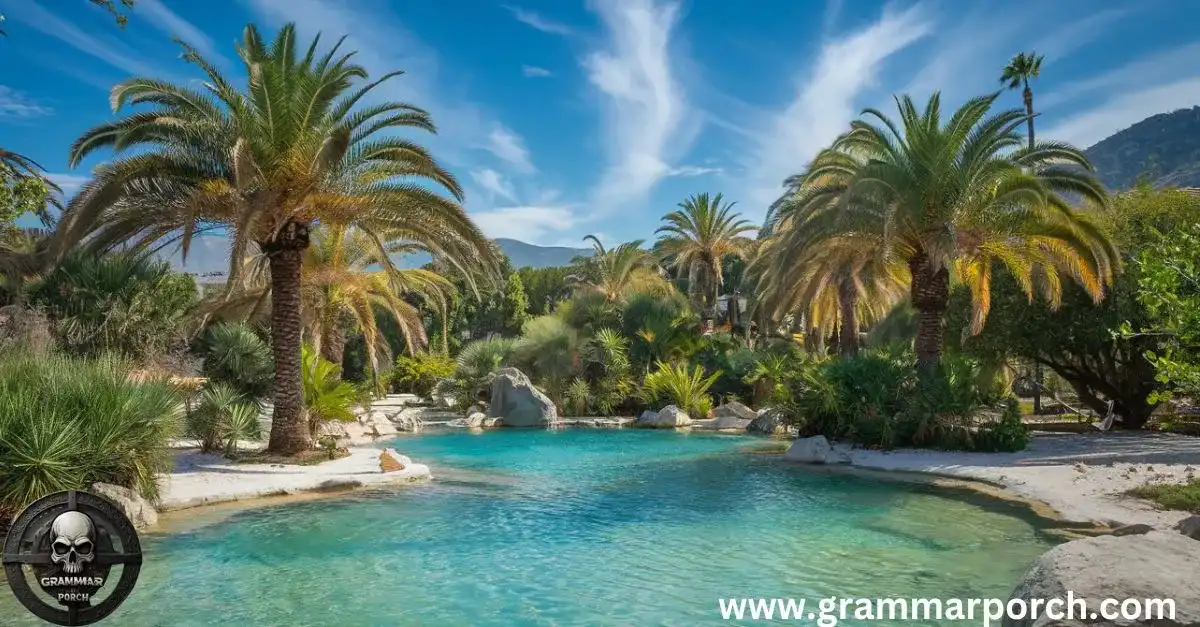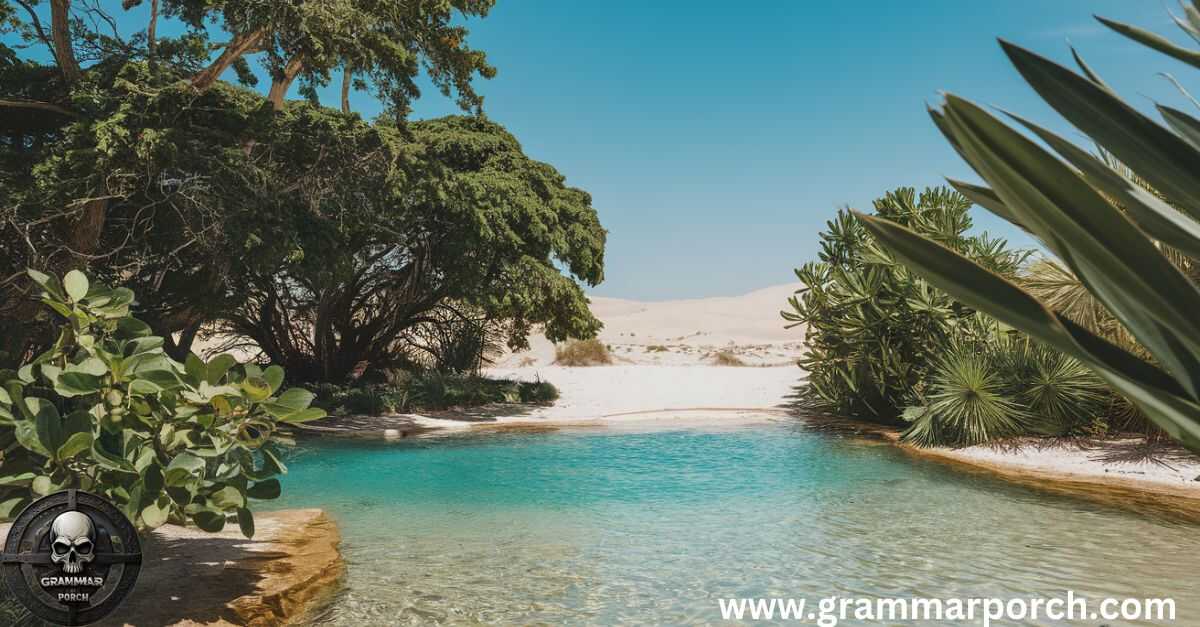Welcome to your ultimate guide about the plural of oasis. Whether you’re writing about desert landscapes or metaphorical sanctuaries, knowing how to correctly use this word can enhance your communication. Now we will discuss everything from its meaning to proper usage in modern English.
What Is The Confusion About The Plural Of Oasis?
The word oasis often creates confusion when writers need to use its plural form. Many English speakers naturally want to add “-es” or “-s” to form the plural, creating “oasises.” However, this instinct leads to incorrect usage. The confusion stems from oasis being a borrowed word that keeps its original Greek pluralization pattern.
This unique pluralization pattern sets oasis apart from most English nouns. Understanding why we use oases instead of “oasises” requires a brief look at how borrowed words maintain their original plural forms in English.
Is Oasis Word Correct?

The word oasis stands as a perfectly legitimate term in the English language. It entered our vocabulary through ancient trade routes, carrying its meaning across cultures and centuries. Modern English has fully embraced this word, using it both literally and figuratively.
The term appears in countless literary works, scientific journals, and everyday conversation. Its widespread use and acceptance make it an indispensable part of the English lexicon.
Definition of Oasis
An oasis represents a fertile area in a desert where water breaks through to the surface, creating a haven of life amidst arid surroundings
. In literal terms, it serves as nature’s rest stop – a place where both humans and animals can find water, shade, and vegetation in an otherwise harsh environment.
Quick Summary
The correct plural of oasis is oases, pronounced as “oh-AY-seez.” This pluralization follows Greek patterns rather than typical English rules. Understanding this distinction helps avoid common mistakes in both writing and speech.
What Does The Word “Oasis” Mean?

The term oasis carries both literal and metaphorical meanings in modern usage. In its literal sense, it describes a fertile spot in a desert where water and vegetation exist. Metaphorically, it represents any place or moment offering peace, relief, or escape from stress.
Contemporary usage has expanded to include urban oases – green spaces in cities that provide refuge from concrete surroundings. These modern interpretations show how language evolves while maintaining its core meaning.
Pronunciation of Oasis
Pronunciation plays a crucial role in mastering any word. For oasis, the correct pronunciation is “oh-AY-sis,” with emphasis on the second syllable. The plural form oases follows a similar pattern but ends differently as “oh-AY-seez.”
Understanding proper pronunciation helps avoid confusion in professional and casual settings. Many English speakers find the plural form particularly challenging, as it differs significantly from the singular form.
What’s the Plural Form of Oasis? A Detailed Table
| Form | Spelling | Pronunciation | Example Usage |
| Singular | oasis | oh-AY-sis | The desert oasis provided water |
| Plural | oases | oh-AY-seez | Several oases dotted the landscape |
| Common Mistakes | oasises, oasis’s | N/A | These forms are never correct |
Oasis (Countable)
The singular form oasis functions as a countable noun, meaning you can use it with numbers and indefinite articles. It applies perfectly when discussing specific locations or individual instances of refuge. In modern usage, writers and speakers employ this form when referring to both natural desert springs and metaphorical places of peace.
Oases (Not Countable)
The plural form oases encompasses multiple instances of these fertile spots or peaceful places. While technically countable, the term often appears in general discussions about desert ecosystems or metaphorical sanctuaries. This form maintains its Greek heritage while serving modern communication needs.
Origin of the Word “Oasis”

The fascinating journey of the word oasis begins in ancient Egypt, where it originally described fertile spots in the desert. The term traveled through Ancient Greek (όασις) before finding its way into Latin and eventually English. This rich etymology explains why the word follows Greek pluralization rules rather than English patterns.
Understanding this historical journey helps explain why we use oases as the plural form. The word’s origin story reflects centuries of cultural exchange along ancient trade routes.
Synonym of Oasis and Oases
“Oasis” (Singular Form)
Natural Environment Synonyms:
- Waterhole
- Spring
- Well
- Fertile spot
- Green patch
- Water source
- Desert garden
- Verdant area
- Life source
- Watering place
Metaphorical Usage Synonyms:
- Haven
- Sanctuary
- Refuge
- Paradise
- Safe harbor
- Retreat
- Shelter
- Hideaway
- Respite
- Port in a storm
“Oases” (Plural Form)
Natural Environment Synonyms:
- Waterholes
- Springs
- Wells
- Fertile spots
- Green patches
- Water sources
- Desert gardens
- Verdant areas
- Life sources
- Watering places
Metaphorical Usage Synonyms:
- Havens
- Sanctuaries
- Refuges
- Paradises
- Safe harbors
- Retreats
- Shelters
- Hideaways
- Respites
- Ports in a storm
Using Oasis in Sentences

“Oasis” (Singular Form):
- The ancient oasis sustained weary travelers for centuries along the Silk Road.
- Her garden became an oasis of tranquility amidst the bustling city.
- Scientists recently discovered a previously unknown oasis in the heart of the Sahara Desert.
- The community center serves as an oasis for local youth in need of a safe space.
- Each room in the spa is designed to create an oasis of relaxation and comfort.
- Surprisingly, the small oasis supported a wide variety of unique wildlife.
- Finding an oasis of quiet in the noisy metropolis was challenging, yet rewarding.
- The library stands as an oasis of knowledge and calm in the digital age.
- That single oasis transformed the lives of the entire desert community.
- The café became his personal oasis during hectic workdays, a place to unwind.
“Oases” (Plural Form)
- Desert oases played crucial roles in sustaining ancient trade routes.
- Modern cities often create artificial oases through thoughtful urban planning.
- The Sahara’s oases support a surprising range of diverse ecosystems.
- Digital oases offer a much-needed refuge from the overwhelm of social media.
- Several small oases dot the arid landscape between major cities.
- Urban planners design green oases within the dense concrete jungles of cities.
- Natural oases helped shape patterns of human migration across vast deserts.
- The country’s parks act as cultural oases, preserving heritage and nature.
- Ancient maps carefully marked the locations of these vital oases.
- Small oases of hope appeared throughout the most difficult times.
Frequently Asked Questions
Why isn’t it “oasises”?
The word follows Greek pluralization rules due to its origin, making oases the correct plural form.
Can “oasis” be used metaphorically?
Yes, the term frequently describes any peaceful or pleasant place offering refuge.
Are all oases natural?
No, artificial oases exist, especially in urban environments and modern architecture.
How common are natural oases?
Natural oases occur relatively rarely, making them precious resources in desert regions.
Can “oasis” be used as an adjective?
While primarily a noun, it sometimes appears in compound phrases like “oasis-like.”
Conclusion
The plural of oasis enriches both writing and speech. Remember that one oasis becomes many oases, following its Greek heritage rather than typical English pluralization rules. This knowledge allows for more precise communication whether discussing literal desert havens or metaphorical sanctuaries.
The versatility of this word, spanning both physical and metaphorical meanings, makes it a valuable addition to any vocabulary. By understanding its proper usage, plural form, and rich history, you can employ it confidently in various contexts.

Larry is an experienced blogger with a passion for simplifying grammar. With years of expertise in writing and language, he shares insightful tips on punctuation, synonyms, and the intricacies of English grammar at **Grammar Porch**. His approachable style helps readers improve their writing skills with ease.

